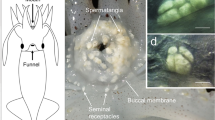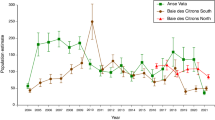Abstract
IN Proc. Roy. Soc., vol. 95, 1923, Mr. H. M. Fox directed attention to a number of cases of “Lunar Periodicity in Reproduction” in marine organisms. To these may be added the hydroid Obelia geniculata. At first sight the periodicity is masked by the irregular breeding of colonies which are wave-worn or much eaten down by nudibranchs, but if attention is confined to healthy and perfect colonies, the lunar periodicity seems quite definite. During 1924 several colonies on the piers were located and watched; the best result was from a colony on Laminaria on Millport old pier, which was giving off medusæ during the ten-day periods beginning with the third week of the moon in July, August and September, and not at other times. Other colonies gave definite results in two consecutive months, but were then attacked by nudibranchs or lost.
This is a preview of subscription content, access via your institution
Access options
Subscribe to this journal
Receive 51 print issues and online access
$199.00 per year
only $3.90 per issue
Buy this article
- Purchase on Springer Link
- Instant access to full article PDF
Prices may be subject to local taxes which are calculated during checkout
Similar content being viewed by others
Author information
Authors and Affiliations
Rights and permissions
About this article
Cite this article
ELMHIRST, R. Lunar Periodicity in Obelia. Nature 116, 358–359 (1925). https://doi.org/10.1038/116358c0
Issue Date:
DOI: https://doi.org/10.1038/116358c0
Comments
By submitting a comment you agree to abide by our Terms and Community Guidelines. If you find something abusive or that does not comply with our terms or guidelines please flag it as inappropriate.



